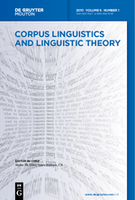
Corpus Linguistics and Linguistic Theory
Scope & Guideline
Pioneering the dialogue between theory and linguistic data.
Introduction
Aims and Scopes
- Corpus-Based Linguistic Analysis:
The journal emphasizes the use of corpus-based methodologies for analyzing linguistic structures, patterns, and usages, offering insights into language variation and change. - Interdisciplinary Approaches:
It encourages studies that bridge corpus linguistics with other disciplines, including cognitive science, social sciences, and historical linguistics, thus fostering a holistic understanding of language. - Construction Grammar:
There is a strong focus on construction grammar, exploring how linguistic constructions are formed, used, and evolve over time, often through empirical corpus studies. - Diachronic Studies:
The journal publishes research that investigates language change over time, utilizing diachronic corpus analyses to trace the evolution of specific linguistic features. - Language Variation and Register:
The exploration of linguistic variation across different registers and contexts is a consistent theme, with a focus on how language use varies in social and situational contexts.
Trending and Emerging
- Cognitive and Semantic Analysis:
There is a growing trend towards exploring the cognitive and semantic aspects of language, often through corpus-based approaches that examine how meaning is constructed and understood. - Usage-Based Linguistics:
The rise of usage-based theories is evident, with many studies examining how frequency and context influence the structure and function of language, emphasizing the importance of real-world language use. - Interdisciplinary Research:
Emerging themes reflect a blending of linguistic research with other fields, such as social sciences and cognitive science, underscoring the importance of interdisciplinary approaches in understanding language. - Learner Corpus Studies:
An increasing focus on learner corpora is observed, with research aimed at understanding language acquisition and proficiency through empirical data from language learners. - Register Variation and Textual Analysis:
Research examining how language varies across different registers and contexts is gaining traction, reflecting an interest in the interplay between linguistic form and social context.
Declining or Waning
- Traditional Syntax Analysis:
Research focused solely on traditional syntactic analyses without incorporating corpus data is becoming less frequent, indicating a shift towards more data-driven approaches. - Static Language Models:
There is a noticeable decrease in studies that rely on static models of language, as scholars increasingly seek dynamic, usage-based models that account for real-world language use. - Narrowly Defined Language Phenomena:
Papers concentrating on very specific or narrowly defined language phenomena without broader implications or connections to larger linguistic theories are declining.
Similar Journals
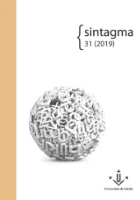
Sintagma
Championing Open Access in Linguistic Scholarship.Sintagma is a prominent academic journal dedicated to advancing the field of Linguistics and Language, published by the Universitat de Lleida in Spain. With an ISSN of 0214-9141 and an E-ISSN of 2013-6455, this journal has established itself as an open-access platform since 1989, thereby ensuring wide accessibility and dissemination of research. The journal's commitment to quality is reflected in its ranking within the Q4 quartile of Linguistics and Language in 2021 and a similar standing in Social Sciences and Arts and Humanities, which underscores its emerging importance in these fields despite recent challenges. Covering topics that span theoretical inquiries to applied linguistic studies, Sintagma invites researchers, professionals, and students to contribute to and engage with its evolving landscape from its unique academic perspective. With the convergence of research years from 2011 to 2018 and upcoming issues through 2024, the journal remains poised to provide insightful content that addresses the linguistic dimensions of contemporary society.

Studii de Lingvistica
Advancing the frontiers of language research.Studii de Lingvistica is a premier open-access journal committed to advancing the field of linguistics and language studies since its inception in 2011. Published by EDITURA UNIV ORADEA in Romania, this scholarly platform aims to disseminate high-quality research that encompasses various aspects of linguistics, encouraging contributions from researchers and professionals worldwide. With an impact factor that reflects its relevance, the journal holds a prestigious position in the Q2 category of Linguistics and Language for 2023. Despite its relatively nascent H-index, Studii de Lingvistica has carved a niche for itself, ranking 1017th and 1094th in Scopus across Arts and Humanities and Social Sciences, respectively. Researchers, scholars, and students alike will find valuable insights and pioneering studies within its pages, making it a vital resource for those engaged in the nuanced exploration of language and its cognitive dimensions. Located at UNIVERSITATII ST NO 1, PAVILION C, ORADEA, BIHOR, ROMANIA, this journal continues to foster academic dialogue and innovation within the linguistics community.
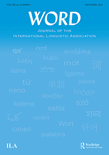
WORD-JOURNAL OF THE INTERNATIONAL LINGUISTIC ASSOCIATION
Elevating discourse through rigorous research and analysis.WORD-JOURNAL OF THE INTERNATIONAL LINGUISTIC ASSOCIATION is a leading peer-reviewed journal dedicated to advancing the field of linguistics and language studies. Published by Routledge Journals, Taylor & Francis Ltd, this esteemed journal has earned a reputation for its rigorous scholarship, reflected in its 2023 Q2 ranking in Linguistics and Language and its solid performance in Scopus Ranks. Encompassing a wide range of topics—from theoretical frameworks to empirical research—WORD serves as an essential resource for linguistics researchers, educators, and students alike. While currently not operating under an open access model, the journal is committed to providing high-quality, impactful research articles that contribute significantly to the linguistic community. With its convergence periods from 1998 to 2009 and 2015 to 2024, WORD continuously fosters the discourse of language studies, ensuring that critical insights and discussions are accessible for ongoing academic exploration.
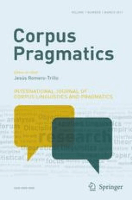
Corpus Pragmatics
Transforming Linguistics with Cutting-Edge Computational ApplicationsCorpus Pragmatics is an esteemed academic journal published by SpringerNature, focusing on the interdisciplinary field of linguistics and its applications within the realms of computer science and social sciences. With a strong foundation since its inception in 2017, the journal has made significant strides, earning recognition with a Q2 rating in Linguistics and Language and a Q3 in Computer Science Applications as of 2023. The journal's impressive Scopus rankings highlight its impact, placing it in the 86th percentile among language and linguistics journals. Corpus Pragmatics aims to bridge the gap between empirical research and theoretical insights, fostering an environment that promotes innovative approaches to understanding the complexities of language use in a digital age. As an open-access platform, it provides researchers, professionals, and students with invaluable resources to enhance their work and engage with the latest findings in the field. With a commitment to quality and relevance, Corpus Pragmatics stands out as a vital resource for advancing knowledge in linguistics and its computational applications, making significant contributions to both academia and industry.
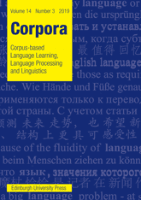
Corpora
Exploring the Depths of Language through CorporaCorpora is a leading journal in the field of Linguistics and Language, published by Edinburgh University Press. Since its inception in 2006, Corpora has established itself as a pivotal platform for scholarly discourse, focusing on the analysis and interpretation of linguistic corpora across various contexts. The journal is recognized for its rigorous peer-review process and boasts a commendable impact within its category, achieving a Q2 ranking in the 2023 Linguistics and Language quartiles. Moreover, it ranks in the 79th percentile in Arts and Humanities Language and Linguistics and in the 77th percentile in Social Sciences Linguistics and Language, underlining its significance in the academic community. While currently not an open-access journal, Corpora is accessible to a broad audience, encouraging contributions from researchers, professionals, and students eager to advance the field of linguistics through innovative research and insightful discourse. For those invested in linguistic studies and corpora analysis, Corpora offers a vital resource and forum for the dissemination of high-quality research.
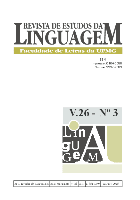
Revista de Estudos da Linguagem
Advancing Understanding Through Open Access ResearchRevista de Estudos da Linguagem, an esteemed academic journal published by the Universidade Federal de Minas Gerais within its Faculty of Letters, serves as a vital resource for scholars in the fields of linguistics and education. Since its inception in 1992, the journal has embraced an open access model, ensuring that research is accessible to a broader audience, thereby fostering collaboration and knowledge dissemination. Based in Brazil, this journal focuses on a wide array of topics related to language studies, contributing significantly to the discourse within the linguistics community. While recent rankings place it in Q4 in Education and Q3 in Linguistics and Language categories, its dedication to publishing high-quality research continues to attract attention despite its current Scopus rankings. The journal notably ranks at #668 in Language and Linguistics, verifying its emerging impact in the academic landscape. Researchers and students alike will find the journal's commitment to diversity in linguistic research a compelling reason to engage with its articles. The journal's offices are located at AV ANTONIO CARLOS, 6627 PAMPULHA, BELO HORIZONTE, MG, BRAZIL, and it continues to invite contributions that challenge established norms and explore innovative themes within the dynamic realm of language studies.
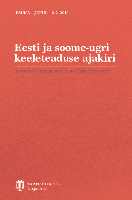
Eesti ja Soome-Ugri Keeleteaduse Ajakiri-Journal of Estonian and Finno-Ugric Linguistics
Bridging Academic Excellence in Language StudiesEesti ja Soome-Ugri Keeleteaduse Ajakiri - Journal of Estonian and Finno-Ugric Linguistics is a premier academic journal published by UNIV TARTU PRESS, dedicated to advancing the field of linguistics with a particular focus on the Estonian and Finno-Ugric languages. Since its inception, the journal has embraced an Open Access publishing model, allowing researchers and enthusiasts to freely explore its groundbreaking studies and findings since 2013. With an Impact Factor that places it in the Q3 quartile of leading journals within the linguistic domain, it serves as a vital platform for the dissemination of new research and theoretical advancements. Ranked 410th out of 1088 journals in the Arts and Humanities category for Language and Linguistics, it reflects a robust commitment to quality scholarship that appeals to academics, professionals, and students alike. Operating from Tartu, Estonia, the journal aims to foster greater understanding and appreciation of the Estonian language within the broader context of Finno-Ugric studies, making it an essential resource for anyone interested in these unique linguistic cultures.
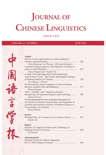
JOURNAL OF CHINESE LINGUISTICS
Pioneering Research in the Heart of Chinese Language StudiesJOURNAL OF CHINESE LINGUISTICS, published by the JOURNAL CHINESE LINGUISTICS, is a prominent periodical that serves as a vital resource for researchers and scholars in the fields of linguistics and Chinese studies. With its ISSN 0091-3723, this journal has been contributing to the academic community since 1996 and continues to publish innovative research until 2024. Although it is classified in the third quartile (Q3) for both Arts and Humanities and Linguistics categories, its focus on Chinese linguistics positions it uniquely within this specialized domain. The journal is committed to advancing the understanding of Chinese language structures, usage, and context, encouraging interdisciplinary dialogue among linguists and language researchers. While currently not labeled as open access, the journal remains accessible to institutions and scholars worldwide, creating an invaluable platform for disseminating knowledge. As such, it plays a critical role in promoting linguistic diversity and cultural awareness within the academic landscape.
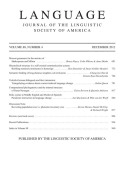
LANGUAGE
Illuminating the Complexities of Human CommunicationLANGUAGE, published by the Linguistic Society of America, is a premier academic journal dedicated to the rigorous study of linguistic theory and practice. With an ISSN of 0097-8507 and E-ISSN 1535-0665, this esteemed journal has established itself as a leading publication in the field of linguistics since its inception. The journal has consistently maintained a high impact factor, being ranked in the Q1 category in Linguistics and Language for 2023, placing it among the top tier of academic journals. Notably, it also holds impressive Scopus rankings, being positioned at #75 out of 1088 in Arts and Humanities, and #89 out of 1167 in Social Sciences, demonstrating a significant impact and reach in the discipline. While it is not an open-access journal, LANGUAGE provides crucial insights into linguistic research, fostering a vibrant academic community. Spanning years from 1996 to 2024, it continues to be an essential resource for researchers, professionals, and students alike, aiming to advance the understanding of language in its myriad forms and functions.

NEUPHILOLOGISCHE MITTEILUNGEN
Advancing Philological Insights Since 1971NEUPHILOLOGISCHE MITTEILUNGEN, published by the esteemed Modern Language Society, stands as a significant contribution to the domain of Language and Linguistics. With a history dating back to 1971, this journal has consistently provided an academic platform for researchers and scholars, navigating through the intricacies of philology and linguistic studies. Although it is indexed in Scopus with rankings reflecting its position in the Arts and Humanities and Social Sciences categories, it currently does not offer Open Access, which may require interested parties to seek institutional access for its wealth of content. The journal has experienced periods of coverage discontinuation in recent years, yet it remains a valued source for advancing the understanding of language theories and linguistic practices. Its location in Helsinki, Finland, offers a unique European perspective on global linguistic issues. The journal is ideal for those looking to engage with evolving linguistic trends and contribute to contemporary discussions in the field.